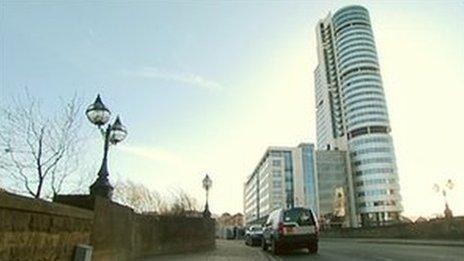Bridgewater Place 'wind tunnel caused Leeds injuries'
- Published

The 367ft (112m) high building was built in 2007
A "wind tunnel effect" around Leeds' highest building that led to one death has caused 25 "incidents", Leeds City Council has revealed.
Edward Slaney, 35, of Sowerby Bridge, West Yorkshire, was crushed after strong winds toppled a lorry near Bridgewater Place in 2011.
A woman, 22, was seriously injured in that incident and two further injuries have been reported since 2007.
In one case the victim was left with a torn liver and internal bleeding.
The phrase "a number of incidents" was included in a report to the council's executive board last month and details of some of the 25 incidents around the building have since been confirmed.
Internal bleeding
Two further injuries included a person blown into the corner of a wall in 2008 and another blown over, the council said.
The 2008 incident left the person with a torn liver, internal bleeding, and a burn to chest caused by hot soup the individual was carrying. The person also received cuts to their chin and knee requiring 11 stitches.
Other incidents included a buggy with a three-month-old child inside being blown over while crossing the road in 2011.
The 32-storey Bridgewater Place is 367ft (112m) high and was built in 2007.
Since then high winds have been experienced around the junction between Water Lane and Victoria Road adjacent to the building in Leeds city centre.
Plans to spend £245,000 designing a solution to the "wind tunnel effect" near Leeds' tallest building were approved by councillors in February.
The report to the council's executive board said: "The wind issues in the vicinity of the Bridgewater Place building on Water Lane have been demonstrated to have been caused by the building."
Dr Lindsay Smales, senior lecturer in building, planning and geography at Leeds Metropolitan University, previously said: "Unfortunately I don't think there's a great deal you can do once you've built a tall building like that to mitigate the problems of micro climate and the effect of the wind.
"The reason why it's a problem is because they're often large slab buildings. The wind hits them and then just goes straight down to the ground because it can't go around."
Tom Riordan, chief executive of Leeds City Council, previously said a wind assessment was carried out on behalf of the developer, as part of the original planning application, which indicated "the impact the building would have on wind speed would be minimal".
He added: "However, since the building was completed, there have been unforeseen wind effect issues around it."
James Lang Lasalle, the building's managers, did not have anybody available to comment.
- Published15 February 2013
- Published10 February 2012
- Published9 February 2012
- Published11 March 2011